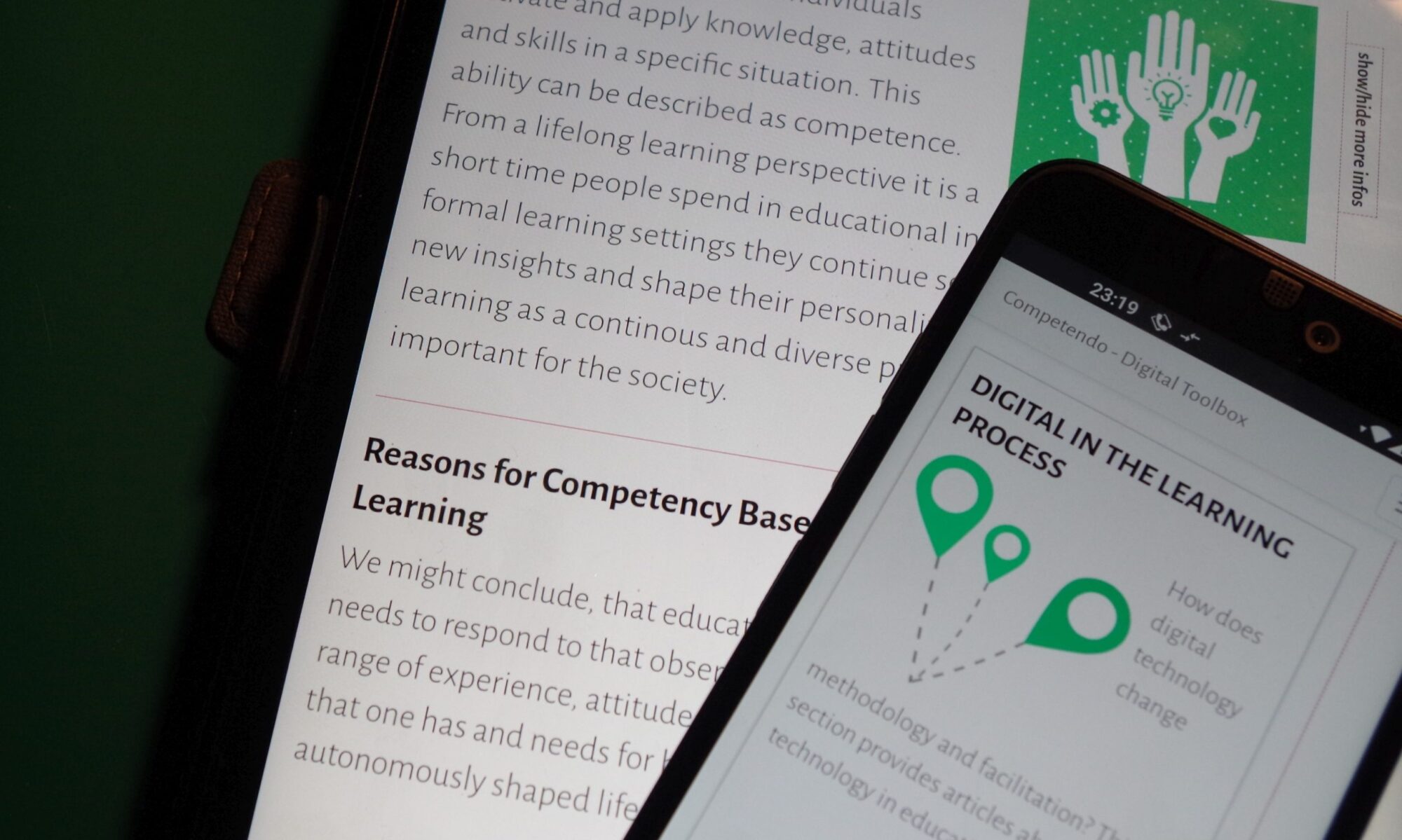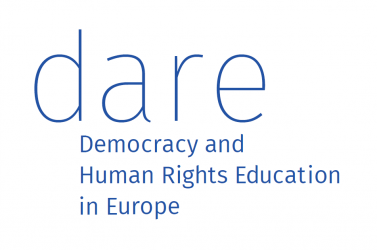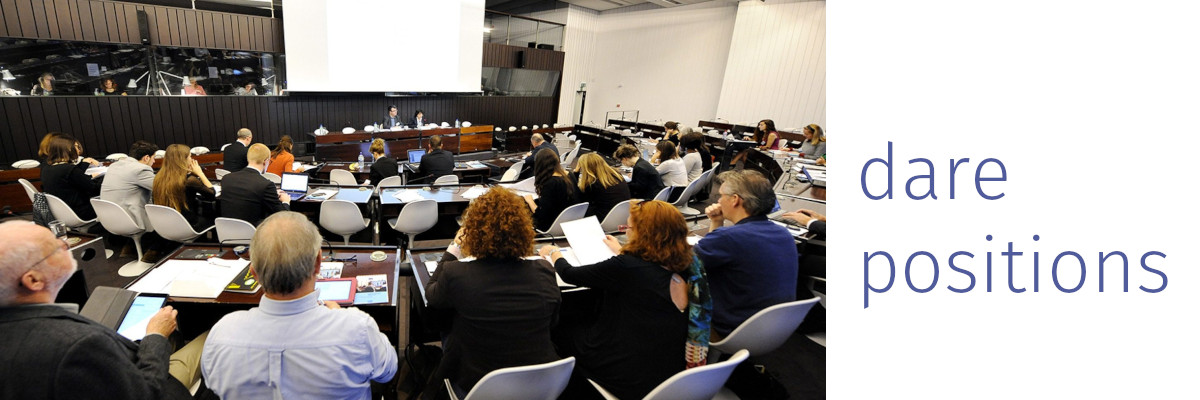DARE network contribution to the European Commission’s consultation on the Digital education action plan (update) in September 2020
Education and the European Way of Digital Transformation
In 2020, digital transformation (DT) arrived at a stage, where platform economy, Artificial Intelligence (AI) and Big Data are mainstreamed and became the central pillar of digital economy. National governments and also the EU are having big expectations toward this development. Compared to 2018, it is aiming to double the number of data professionals to 10.9 million people by 2025 and nearly trippeling the value of the EU 27 data economy to €829 billion, which amounts to 5.8% of the EU GDP.
EU is aiming to become a global leader in an ethical AI and big data approach, like expressed in the EU Commission‘s communication Artificial Intelligence for Europe, the Europan data strategy, and the 2020 White Paper on Artificial Intelligence (in continuation of the 2014 Digital Agenda).
The European data strategy is led by the vision of a balanced “European way’: “In order to release Europe’s potential we have to find our European way, balancing the flow and wide use of data, while preserving high privacy, security, safety and ethical standards”. In particular this vision builds on a “single European data space” (EU COM 2020/66 final).
What can be the role of education in this context? A European way of digital transformation is building on strong legal and ethical principles. In order to meet this goal, the EU needs knowledge, commitment and empowerment of users, respectively of the produsers of the data, the citizens. It requires also their ability to involve in democratic governance and decision-making regarding the framing conditions and regulations. Education as such is still far away from having these competences and capacities to address this “bigger picture” or holistic understanding of digital transformation going beyond STEM capacities and actively asking also for an ethical and power critical perspective.
We appreciate the holistic and inclusive approach behind pioneering projects such as the competency framework DigComp 2.1 or other similar projects, but argue, that the socio-political reflection must be included more in making Europeans fit for the digital age. Furthermore, the focus on youth and formal education in many debates in the field of digital education seems for us to be inappropriate. Digital education must take the lifelong learner in the focus.
Also the digital key policies of the EU should be more represented as topics in the European digital education and the knowledge basis of educators about these developments needs to be broadened.
Citizenship
When we raise the importance for the socio-political dimension of learning about digital transformation we are building also on the evidence delivered by the EU Commission and the Parliament. The DARE project DIGIT-AL – Digital Transformation in Adult Learning for Active Citizenship is facilitating a cross-sectoral exchange between learning providers and policy level, not only in the field of education, but also in the policy fields, where digital transformation is brought forward (for instance European Digital Single Market). Our impression is, that it seems not to make a big difference to whom you speak, if to representatives from civil society, industry or the European Commission: many demand better preparation of the Europeans for the upcoming challenges. Many are fearing social and economic polarisation which could be the consequence if Europeans are not sufficiently informed about risks and potentials of technology and empowered to co-create the digital transformation in a democratic and social way. We conclude, if the European way can be successful, then only with informed and participating citizens.
Work
As a condition for upskilling in the context of work, people need to understand better, how the drivers of DT, for instance automatization/robotics, platformisation, AI, biometry and datafication, or digitally facilitated forms of collaboration are having an impact on their work context. The Commission’s White Paper on Artificial Intelligence highlighted in particular the risk connected with biometry and analytics in the employment sector. Information is here a crucial condition for co-determination and for the expression of employees positions. Education in the employment/VET context needs also to provide a better understanding of the business/governance models underlying the datafication of work relations and working spaces.
These processes are evolving incrementally and education has the crucial role to create opportunities where concrete developments in a certain context could be reflected and better understood. Employees and platform workers need to understand better where this all should lead to in order to co-determine and influence the decisions.
In particular, better collaboration between civil society (for example organisations tackling consumer rights, digital rights and labour rights), VET institutions, and non-formal learning providers could be an adequate frame and approach to address these questions.
Recognizing Civic Education
In particular, Education for Democratic Citizenship/Human Rights Education has experience in translating the meaning and relevance of human rights and democratic principles to citizens. It is training critical thinking and breaking down socio-political complexity so that learners might access these topics and build their position. Furthermore, active citizenship education is empowering citizens in their everyday life for involving in policy discussions and public discourses. It should be much more recognized in the renewed plan.
The essence of a definition of democracy and rights-based education can be found in the Council of Europe’s Declaration regarding Education for Democratic Citizenship (EDC), which is “education, training, awareness-raising, information, practices, and activities which aim, by equipping learners with knowledge, skills and understanding and developing their attitudes and behaviour, to empower them to exercise and defend their democratic rights and responsibilities in society, to value diversity and to play an active part in democratic life, with a view to the promotion and protection of democracy and the rule of law.”
Therefore, the EU Commission’s understanding of digital competence could be complemented more by finding instruments and support for formal and non-formal education helping learners/citizens/employees to find answers on the questions:
- What digital transformation competences – knowledge, skills, values and attitudes – do citizens need to understand the digital transformation in their society and how it affects them in their different social roles?
- How are fundamental rights and ethical foundations related to the transformation? Where do they shift their nature, what weakens them and what kind of development strengthens their enforcement?
- What active civic competences do citizens need to contribute to the transformation, including participation in relevant public discourses and decisions, self-organisation and social engagement, and the development of social innovations.
Prospective examples from the fields of EAT with youth and youth work can be mainstreamed into lifelong learning: Raising curiosity and understanding of the technical aspects – for instance coding, robotics, algorithms, or hacking. And also facilitating knowledge and instigating discussion and reflection about the produser role in social media. In this sense, we ask for more exchange and cooperation between youth and adult education in regard to methodology and approaches.
Digital transformation is no dragon, but an all-embracing and open-end social, economic and cultural project. A European Way to digital education needs to include this holistic picture of digital transformation with a better recognition of civic education.
Core Topics of Digital Transformation Education
Ubiquitous computing is from the perspective of individual users intuitive and becoming a matter of course in Europe. However, this comes with two challenges – information and overview. Lifelong-learning in schools, higher education, adult education, as well as in formal and non-formal learning contexts, might contribute to information about the functioning, purposes and abilities of the ubiquitous technology in our manifold everyday spaces – at work, at home, or in the public space. It might raise awareness of learners about the concrete functioning and tackle the risks, potentials and challenges connected with the application and development of the Internet of Everything.
Biometric Technology is another challenging field. Increasingly distributed to private customers, companies and the state, it allows easier identification, access regulation but also monitoring and control of individuals. The private and public use of biometry for monitoring spaces and access to spaces raises democratic concerns or the danger of discrimination. Among other documents published by the Institutions or the FRA, the White Paper on AI was highlighting the risk potential behind this technology.
Algorithmic data analysis processes in the context of big data are raising concerns of many Europeans. A majority of Europeans is in particular sceptical toward Big Data and Artificial Intelligence. A related aspect is tracking and people analytics. However, nor does the public discourse on digital transformation respond to this concerns, nor education.
Harmful Internet Use, amplifying algorithms in social media, discrimination or online hate speech are more in the focus, at least in the field of youth education. However, in order to overcome these practices, also more systemic knowledge needs to be facilitated, including knowledge about the underlying purposes and economic goals of these media platforms and about the different options for their regulation and control.
With the General Data Protection Regulation the topic privacy became more political visibility and priority. However, we don’t see in the educational field a similar increase of privacy education and are demanding more ambition from EU and also the field.
Also in regard to digital copyrights citizens are, although many of them are produsers of (social) media content, uninformed and uncertain. The emotional public discussions on the Directive on copyright and related rights in the Digital Single Market in 2019 showed the relevance of this policy field.
The environmental impact of digital transformation is discussed under the aspect of circular economy as part of the Green New Deal. In particular the EU Commission aims to come up with regulatory measures under the Ecodesign Directive, to work toward a new ‘right to repair’ and a Circular Electronics Initiative. Time to include digital aspects in Education for Sustainable Development and ecologic education.
Also the development and regulation of the platform economy is an important topic, identified by European politics and expressed in the Digital Single Market ambition, which is not yet sufficiently reflected in curricula and educational offerings in formal and non-formal education.
For the DARE network:
Brussels, September 3, 2020
Nils-Eyk Zimmermann Georg Pirker
Secretary Chairperson
office@dare-network.eu


